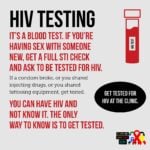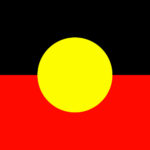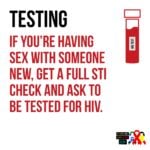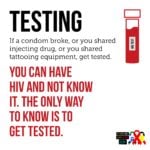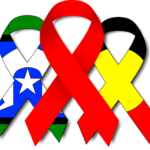About HIV | U & ME CAN STOP HIV | Testing for HIV | HIV Treatment | Living with HIV
Testing for HIV
How often should I test?
If you have sex regularly it’s important to have regular check-ups to make sure you don’t have any STIs or HIV. Most people get HIV from people who aren’t aware they have HIV. You could be having sex with someone who doesn’t know they have HIV – or you could be thinking you don’t have HIV and having sex without condoms.
Checks for HIV and STIs are called sexual health checks. Having sexual health checks is part of looking after yourself and your sex partners – and it’s good for our whole community. STI rates are high in our community and HIV rates are going up. The more we test for HIV and STIs, and get treated, the quicker we’ll bring down HIV and STI rates in our community. Tests for STIs like chlamydia, gonorrhea or syphilis don’t test for HIV.
If you’ve had unsafe sex or shared injecting or tattoo equipment, ask your doctor or clinic for an HIV test as well. Testing regularly for STIs and HIV means that you can be diagnosed soon after getting an infection. You can then get treated before it starts making you too sick, and you can let your sex partners know so that they can get tested too.
What about if I’m in a relationship? 
If you are in a relationship it’s important to keep using condoms for STI and HIV prevention until you’re both certain that neither of you has an STI or HIV. If you can, it’s a good idea to talk to your partner about whether either of you will be having sex with other people. If one of you has unsafe sex with someone else, you may need to use condoms again until you both get tested for STIs and HIV.
Testing is the only way to be certain.
Blood tests – how are they done?
Tests for HIV are full blood tests done at a laboratory.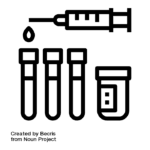 For full blood tests, blood is taken from your vein by your doctor or nurse, and a sample is sent off to a lab. The lab does the test and lets your doctor know the result. If the test shows you have HIV, your doctor will explain what this means. They’ll talk to you about starting on HIV treatment tablets and explain that you need to be extra sure to use condoms every time you have sex. Some places can also do “rapid tests” for HIV.
For full blood tests, blood is taken from your vein by your doctor or nurse, and a sample is sent off to a lab. The lab does the test and lets your doctor know the result. If the test shows you have HIV, your doctor will explain what this means. They’ll talk to you about starting on HIV treatment tablets and explain that you need to be extra sure to use condoms every time you have sex. Some places can also do “rapid tests” for HIV.
Have a look at this Young Deadly Free factsheet for more information about testing for HIV, hepatitis B and C, and STIs.
Where can I get tested? 
You can get tested for HIV at your GP, Aboriginal community health service or clinic. You can also get your local doctor to organise an HIV test.
Sexual health clinics provide free and confidential testing services. Some people are embarrassed to ask their family doctor for a test. Sexual health clinics do STI and HIV tests all the time and you might find it easier to talk about your sex life or drug use with a clinic health worker than with your family doctor or Aboriginal health service.
HIV rapid tests
Some doctors, sexual health clinics and community services provide HIV rapid tests. They are called rapid tests because the test is simple and quick. Usually a small amount blood is taken by pricking your finger. You then wait at the doctor’s office or clinic for twenty minutes or so, and get the result.
HIV rapid test results are not final. If a rapid test of your blood is “reactive”, this just means you might have HIV. You’ll then have a full blood test done at a lab to find out whether you have HIV. If you do have HIV, the lab will let your doctor know.
What if the test says I don’t have HIV?
If you only got HIV within the last couple of months, it may not show up in an HIV test. This is because of what’s called the ‘window period’.
If you’ve had unsafe sex or shared needles within three months before being tested, it’s important to test again in three months to double-check you don’t have HIV.
If I have HIV, who will be told?
The laboratory that tests your blood will tell your doctor the result of your HIV test. They are not allowed to tell anyone else.All the medical information your doctor has about you is confidential. If you have been diagnosed with HIV, this information is confidential too. Doctors are generally only allowed to tell other people about your medical conditions if you tell them they can, or you give “consent” for the information to be shared.
All cases of HIV are counted by state and territory health departments. Your doctor will tell the health department that someone has been diagnosed but won’t tell them your name. The health department needs to know about the number of new cases of HIV so they can make sure people with HIV get good health care. The information on the numbers of people getting HIV, and how they got HIV, is also important for research. Collecting this information means that community health services can be funded to educate communities about HIV prevention, and support people in our community who are living with HIV.
Letting your sex partners know
If you are diagnosed with HIV, your doctor will talk to you about letting your sex partners know they should get tested for HIV. This is to make sure they don’t have HIV too. This is called “contact tracing” and can be done without mentioning your name. Your sex partner will just be contacted and advised that it’s time for them to get tested for STIs.
Contact tracing is not about blame. You may have gotten HIV from one sex partner, and you may have passed HIV on to another sex partner before you were diagnosed. Contact tracing is just to make sure that as many people as possible who may have HIV get tested and treated.
Have a look at the Better to know website for advice about different ways you can contact sex partners – including on how to do this anonymously.
.


